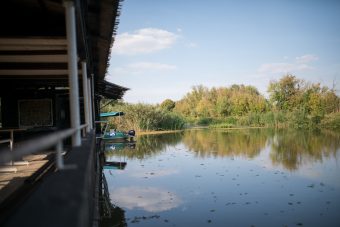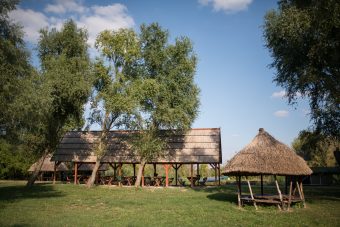
How Carska bara recovered after the fire incurred by stubble burning and how wildlife is taken care of at the Special nature reserve Carska bara, we asked Dejan Zejak, the manager of fish farm Ecka, which runs the above-mentioned nature reserve. Needless to say, we took advantage of that chance to also find out to what extent is the popularity of Carska bara as a tourist attraction and what the traditional cuisine of this region is.
The last year battle for preserving the natural resources of this region against the blaze Dejan Zejak described as a casualty in which the area affected by the fire had added up to 338 hectares. “It was sheer luck that it was October, the time of the year when offsprings had already grown up and managed to draw back in the face of the flame while migratory birds had moved south”, explained Dejan. He added that the belvedere was burned down, as well as the wooden footpath that stretched to it and was at the part of the reserve which was inaccessible to firefighters.
The cause of the fire in these circumstances usually appears to be reckless stubble burning. Last autumn, the fire spread from the summer home area, which lies along the Zrenjanin-Belgrade road, straight to the nature reserve. As the cold wind was blowing that day, ember was flown across the Begej channel into the nature reserve. Initially, the part of the nature reserve called Perleska bara caught fire, that was subsequently spread to Tiganjica, Stari Begej, also Carska bara, Botoski rit and Fakazdinski rit. The blaze was spreading ever further towards the village of Belo Blato, but it was eventually put out on the edge of that village.
Upon being asked how these accidents might be prevented, but also how to get through to the farmers in the most efficient way to reduce the consequences incurred by stubble burning, Dejan Zejak replied that it is necessary to “educate citizens and bring awareness of damage caused by stubble burning”, indicating for that matter that the latter activity primarily spoils the soil quality. Also, he believes that the culprits, namely those who keep on clinging to that bad custom, should be fined.
However, Dejan suggests that this autumn fewer fires were registered in the area, along with more strict control. He reckons that it is still going to take a lot of time until this dangerous habit of thoughtless people becomes eradicated.
Among the reed and rush
Each year, this nature reserve in cooperation with the Bird Protection and Study Society of Serbia observe the number of birds’ species and their migration. And how impressive the particularities of plants and wildlife of this nature reserve are, says Dejan. “The major signature of this place is birds and here is one of the most significant ornithology station in this part of Europe. Neither one protected area has at its verges a fish pond of this size which serves as a huge food resource and a cause of this high numerosity and variety of birds. Around 250 birds’ species are registered here, as well as animals that feed on fish. All ten species of herons which live at the European continent nest only in our nature reserve. There are white-tailed eagles, but also a huge number of otters is reported, which are classified as highly protected species and true indicators of water quality. When it comes to fauna, there are more than 500 different plants.”
Fighting the fire wasn’t the only challenge the nature reserve had to deal with. A few years ago they had problems with sludge deposits which threatened plants and wildlife in the fish pond, reducing at the same time the number of tourist visits as the approach to the tourist boat was restrained. Last year they got a small grant from the Ministry of environmental protection for meeting the costs of partial dredging of the part of the Stari Begej bed. The fish farm Ecka now serves as the only source of income being used for improving the tourist offer at the nature reserve.

Protection first, tourism later
As for tourism, the nature reserve Carska bara is a typical case of sustainable tourism, and as such it is cited in the books for positively demonstrating the advance on that field. “The number of the visitors is limited due to the specificity of the nature reserve and sustainable development, so we can’t aim for a significant rise in the number of tourists as it would lead to endangering the birds which are the main feature of this reserve. Our employees take care of the visitors’ conducts, and the focus of our tourist offer is on education and raising awareness of the proper treatment towards nature”, says the manager of the fish farm Ecka pointing out that the reserve protection is primary. “Tourism is secondary, for that matter.”
He believes that their tourist offer could be significantly improved by building another belvedere, getting canoes and pedalos, as well as by placing information and education boards which would give pieces of advices to visitors in the reserve zones where those activities could take place. It seems that the full potential of this place hasn’t been tapped into, which is caused by the lack of money, which is their biggest obstacle.
The staff at the fish farm tries to save this nature reserve from climate change. Dejan brings out that they pay special attention to restraining the human factor so that it doesn’t ruin the natural processes of the ecosystem. During the cold winters, the reserve’s staff makes small apertures in the ice to provide fishes with oxygen. In contrast, during the extreme droughts they pump in water into Carska bara so that the ecosystem wouldn’t be in danger. All of these activities are done according to the directions given by the Institute for nature conservation of Serbia.
In focus:
Dejan thinks that the situation with the fishery and its future in Serbia is volatile, as it all depends on factors which affect the production estimation, such as viruses and diseases, whose effect is damage beyond repair. Talking about downsides, he stresses the problem of the black market and also extremely low subsidies in comparison to the region, which substantially reduces competitiveness.
However, along with all challenges, the tale about the Ecka carp still goes around. This fish has been bred at the Ecka fish farm ever since 1891, and it is known for its particular taste which probably should be attributed to the water and soil quality, namely substrate of the fish pond. There was the time when the Ecka carp was a must-have delicacy at the restaurants’ menus and holiday dinner tables throughout former Yugoslavia, and it was also exported to Macedonia, Italy and Germany. Today the widely famous carp of Ecka can be found at some chain stores and delicacy stores.
Dejan told us about his favourite fish recipe. The delicacy name is the Carska fish broth which is made from carp fillets, and you can try it next time you head for Zrenjanin if you remember this article, so you decide to take a break at Carska bara.
Prepared by: Jelena Cvetic
This article was published in the new issue of Energy portal Magazine GRINNOVATIONS, December 2019 – February 2020.



